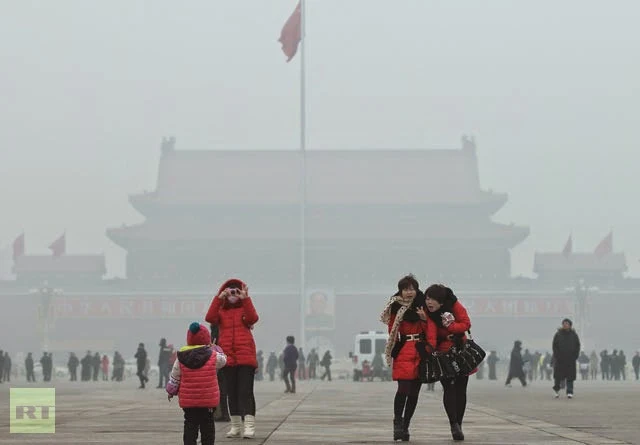A dazzling fireworks show, marking the first major global celebrations of the Chinese Lunar New Year, took place here Tuesday evening over the Hudson River.
The 20-minute fireworks display was the first large-scale fireworks display ever in the United States, to commemorate the Chinese Lunar New Year, which officially falls on Feb. 19 and is said to be celebrated by approximately one out of every six people in the world.
"It was fabulous! It's extraordinary beautiful," said Susan King, who works for a non-government organization promoting teaching exchange between China and the United States and was invited to watch the fireworks in the Consulate-General of China in New York.
"The music was lovely. It's exciting to be able to come here to watch the celebration of the Chinese New Year. We feel very honored to be here for that," she said.
Titled "Harmonious China," the fireworks display commenced at 7:30 p.m. local time (0030 Wednesday), utilizing three-barges on the Hudson River, nearly equaling the scope of the iconic Macy's Independence Day Fireworks Spectacular.
Artistic director of the event Huang Jiancheng said he hopes to express the joy through the fireworks.
Yu Ding, dean of Arts Administration and Education Institute, Chinese Central Academy of Fine Arts (CAFA), said that he hopes the tradition of lighting fireworks during the Chinese New Year will bring New Yorkers happiness and joy, and deliver Chinese wonderful blessings to the United States and the rest of the world.
Viewing was possible along the Hudson River from both Midtown Manhattan and New Jersey sides, and there was also a live accompanying music broadcast on three local radio stations, featuring special music composed by Guan Xia, director of the China National Symphony Orchestra.
The fireworks display was divided into four thematic and emotional chapters -- starting with "Great Jubilance," followed by "The Return of Spring," then "Illumination of Stars and the Moon," and concluding with a powerful "Universal Celebration."
The fireworks kick off a week of Lunar New Year events at cultural institutions around New York City as part of "Happy Chinese New Year: Fantastic Art China," including a public art exhibition at Lincoln Center, a lighting display of the Empire State Building and other events hosted by US and Chinese partners.
Source:Xinhua - globaltimes.cn
18/2/15
--
-
Related:
------
The 20-minute fireworks display was the first large-scale fireworks display ever in the United States, to commemorate the Chinese Lunar New Year, which officially falls on Feb. 19 and is said to be celebrated by approximately one out of every six people in the world.
"It was fabulous! It's extraordinary beautiful," said Susan King, who works for a non-government organization promoting teaching exchange between China and the United States and was invited to watch the fireworks in the Consulate-General of China in New York.
"The music was lovely. It's exciting to be able to come here to watch the celebration of the Chinese New Year. We feel very honored to be here for that," she said.
Titled "Harmonious China," the fireworks display commenced at 7:30 p.m. local time (0030 Wednesday), utilizing three-barges on the Hudson River, nearly equaling the scope of the iconic Macy's Independence Day Fireworks Spectacular.
Artistic director of the event Huang Jiancheng said he hopes to express the joy through the fireworks.
Yu Ding, dean of Arts Administration and Education Institute, Chinese Central Academy of Fine Arts (CAFA), said that he hopes the tradition of lighting fireworks during the Chinese New Year will bring New Yorkers happiness and joy, and deliver Chinese wonderful blessings to the United States and the rest of the world.
Viewing was possible along the Hudson River from both Midtown Manhattan and New Jersey sides, and there was also a live accompanying music broadcast on three local radio stations, featuring special music composed by Guan Xia, director of the China National Symphony Orchestra.
The fireworks display was divided into four thematic and emotional chapters -- starting with "Great Jubilance," followed by "The Return of Spring," then "Illumination of Stars and the Moon," and concluding with a powerful "Universal Celebration."
The fireworks kick off a week of Lunar New Year events at cultural institutions around New York City as part of "Happy Chinese New Year: Fantastic Art China," including a public art exhibition at Lincoln Center, a lighting display of the Empire State Building and other events hosted by US and Chinese partners.
Source:Xinhua - globaltimes.cn
18/2/15
--
-
Related:
------














 GR
GR FR
FR DE
DE ES
ES IT
IT RU
RU EU
EU